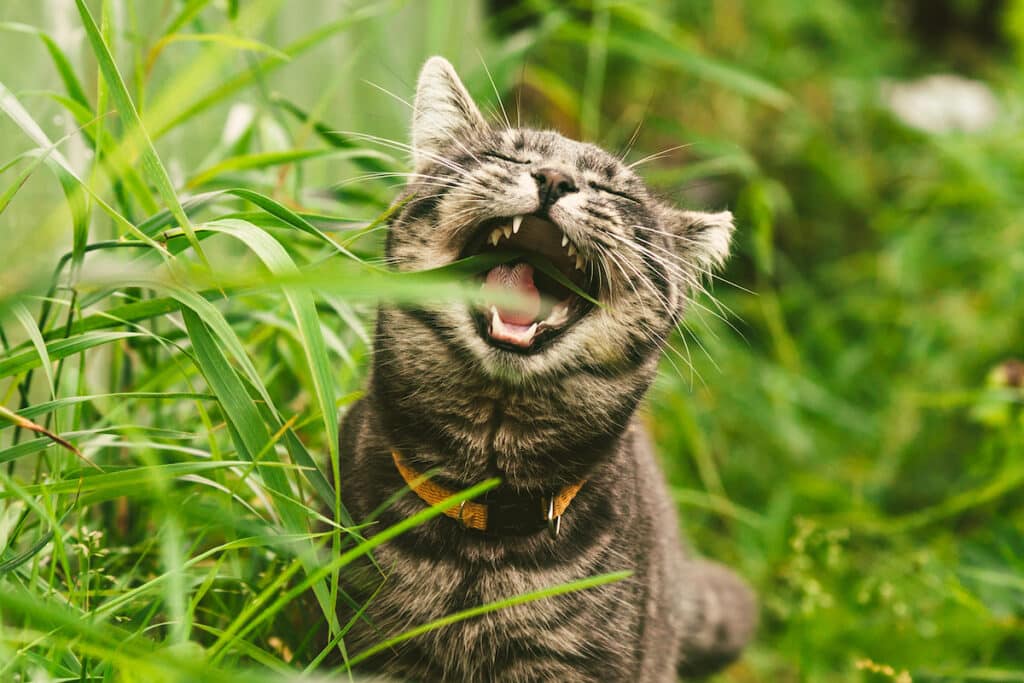Why Do Cats Eat Grass?
Grass can be a great source of nutrient and nutrition for your cats. It contains a variety of fiber, laxative, and folic acid. These nutrients can help keep your cat healthy and thriving.
Folic acid
Grass is full of nutrients and fiber. In addition, it acts as a natural laxative, which helps to keep the digestive system functioning properly. There are also many trace nutrients in grass, which are helpful for overall bodily functions.
Grass also contains folic acid, which is an important B vitamin. It helps the body produce haemoglobin, a protein rich in iron that transports oxygen throughout the blood. It also aids in digestion and cell growth.
Some people believe that if a cat does not have enough folic acid, it will turn to eating grass. Although this is a theory, studies have not proved it to be true. However, it is a good idea to limit a cat’s intake of grass.
Some cats eat grass for the taste. Others turn to it as a way to relieve stress. In addition, some cats may eat grass to get rid of hairballs. They also drink grass juice to relieve throat inflammation. It can also help them pass worms.
Laxative
Grass has a laxative effect on cats. It adds fibre to their diet and helps eliminate hairballs. It is also a good source of needed trace minerals and vitamins A, B and D.
The laxative effect of grass on cats may be a sign of a more serious digestive problem. If your cat appears to have a hairball or poop blood every day, it’s a good idea to get him checked out by your veterinarian.
Grass is a good source of folic acid, which helps to boost the production of hemoglobin, a protein that’s important in blood oxygenation. It’s also a good source of vitamins A and D, which can increase the immune system and make your cat less prone to illness.
Grass also contains chlorophyll, which may help to alleviate minor ailments. Some scientists believe that this natural nutrient may have helped cats in the past to deal with pain and infection.
Some cats find it stimulating to chomp on grass. Besides calming their nerves, grass can also be a nutritious snack for your pet.
Healthy digestion
Grass is a source of vitamins, minerals and trace nutrients. It can provide relief for constipation and help your cat move along the GI tract more quickly. It also aids in the elimination of hairballs and other things that can irritate the digestive tract.
Grass contains folic acid, which is an important vitamin that supports the growth and functioning of your cat’s organs and blood. It also assists in the production of hemoglobin, a protein that is essential for oxygenation in the blood. Folic acid can also help your cat fight off bacteria and other infectious agents.
Grass also contains fiber, which can provide relief for constipation and help your cat move along the GI tract more quickly. It also helps to stimulate stomach muscles. It can also act as an antacid tablet, which can help to alleviate discomfort.
Grass may also be helpful in ridding your cat of internal parasites. These parasites can cause weight loss and other problems.
Fiber
Grass is a good source of fiber for cats. Fiber helps food to pass through the digestive tract and may also help clear up constipation. It is also a good source of vitamins and minerals. In the wild, cats eat grass to help expel parasites and other inedible materials.
The folic acid in grass helps the body produce hemoglobin, a key component of the cat’s blood. Hemoglobin is necessary for the cat’s blood to carry oxygen throughout its body.
Cats also eat grass to clear their systems of hairballs. Hairballs can be a dangerous blockage if left untreated. If a cat’s fur gets in the way of their digestive tract, they can throw up. The fiber in grass may help the hairball pass through the system, allowing them to poop easier.
According to researchers at the University of California, Davis School of Veterinary Medicine, grass can act as a natural laxative. Aside from providing a different flavor and texture, grass also provides fiber, which helps food pass through the digestive tract.














